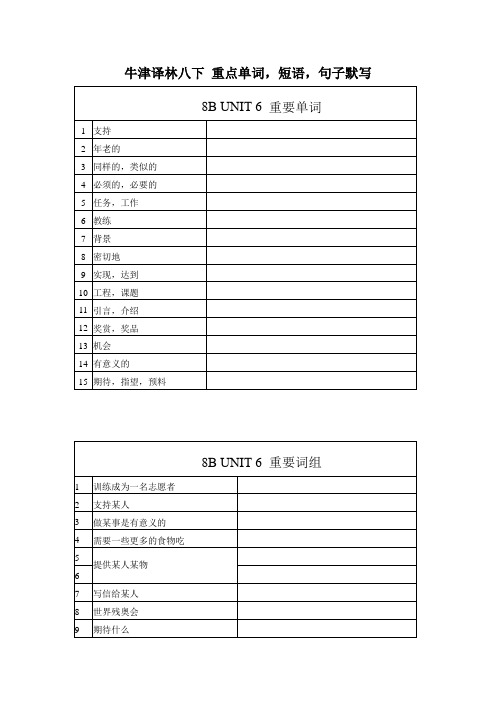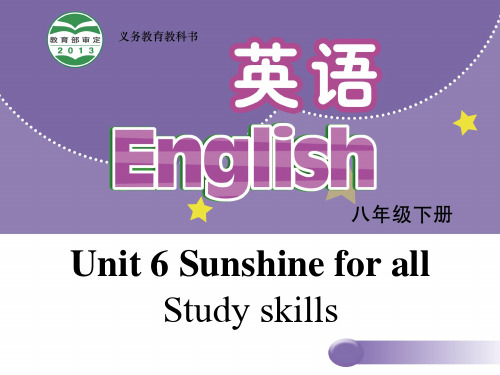【牛津版】八年级下册:Unit 6 Sunshine for all Integrated skills课件
牛津译林版八年级英语下册《Unit 6 Sunshine for all Integrated skills》课件 5

Have a discussion
Do you want to be a volunteer teacher in the
future? Why?
Speak up: How can we help people in our daily lives
Listen to the conversation and list the ways they are talking about to help people in our daily life.
1. What is Judy? a A college student. b A primary school teacher.
2. Where is she going? a South-west China. b North-west China.
3. Why is she going there? a For a volunteer project. b For a training plan.
Judy thinks it is meaningful for college students to learn more about (11) _th_e__p_o_o_r_a_r_e_a_s of China. It is also helpful of them to (12) ___te_a_c_h__ the children there. In this way, they can help local people improve their lives.
Do you know volunteer teacher? Now let’s watch a video about it.
A1
Peter’s cousin Judy is telling him about a volunteer project. Listen carefully. Help Peter answer the following questions by choosing the correct answers.
牛津译林版英语八年级下Unit 6 Sunshine for all单词,短语,句子默写(含答案)

1
用这种方式,他们能够帮组当地人改善生活。
In this way, they can help the local people improve their lives.
2
自从上个月起,他就住院了。
He has been ill in hospital since last month.
25
取得第四名
26
感到更加自信
27
因为
28
齐聚一堂
29
来自不同背景
30
感觉像一个大家庭中的一员
31
亲密地工作
32
实现某人的梦想
33
34
35
没有得到报酬
36
赢得第一名
37
举办
38
做某事是有趣的
39
对做某事感兴趣
40
给老人让座
41
捐钱给慈善机构
42
赢得比赛
43
一对一地做某人的工作
44
没有某人的帮助
45
有一些经验
46
一个大学生
a college student
47
中国西南
south-west China
48
一个志愿者项目
a volunteer project
49
在某人的日常生活中
in one's daily lives
50
采取行动保护环境
take action to protect the environment
4
必须的,必要的
necessary
5
任务,工作
task
6
教练
coach
牛津译林八年级Unit 6 Sunshine for all Integrated skills

(6)E_n__g_li_sh__ and Maths teaches them (7) s_o_n_g_safter class gives them a lot of (8) _b_o_o_k_s_
What she thinks: meaningful to learn more about (9) t_h_e__p_o_o_r_a_r_e_a_s__ of China helpful to (10) _t_e_a_c_h__ the children there
2. keep in touch 保持联络
e.g. Wherever you go, keep in touch
with me, please.
无论你去哪里,请与我保持联络。
3. daily life 日常生活
day (n.) --- daily (adj.)
e.g. 日常英语 daily English
日常报纸
daily newspapers
4. save our pocket money 储存我们的零花钱 此处save的意思为“储存” e.g. If you save money now, you will be able to buy a car soon. 如果你现在存钱的话,你不久就能 买小汽车了。
15、一年之计,莫如树谷;十年之计,莫如树木;终身之计,莫如树人。2021年8月2021/8/132021/8/132021/8/138/13/2021
16、提出一个问题往往比解决一个更重要。因为解决问题也许仅是一个数学上或实验上的技能而已,而提出新的问题,却需要有创造性的想像力,而且标志着科学的真正进步。2021/8/132021/8/13August 13, 2021
【牛津版】八年级下册:Unit 6 Sunshine for all integrated课件

Guide Three Let students complete part A3 using the
Unit6 sunshine for all Integreted skills
Learning aims
1 To get information according to listening
2 To develop students’ listening
Guide One
Listen to the tape and help Peter complete part
D
( )6.We’ll _______some money by holding a charity sho C w, then _______ it to poor students in the west. A. raise, raise B. donate, donate C. raise, donate D. donate, raise ( )7.Although he was a child, he tried to find ways ______ _ people _____ a better life. A A.to help ; enjoy B. help ; enjoy C. to help ; enjoying D. help ; enjoying ( )8.They often greet each other _____ C emails. A. to send B. of sending C. by sending D. with sending ( )9.It’s not easy _________ him to take care of ______ D ___ many children during the trip. A. of; such B. for; such C. of; so D. for; so ( )10.Jim sat ___ to his mother with his eyes half _______. A. closed, opened B. close, open C C. closely, opening D. close, opened
八年级英语下册 Unit 6 Sunshine for all Study skills课件 (新版)牛津版

First, we had fun on Space Mountain. It was
really exciting! Next, we hurried to a restaurant to
main body have a quick meal. Then, we watched a parade of
Time order
Space order
write about an experience or an event.
describe a place or an object.
Can you list other methods of organizing the ideas?
of Sleeping Beauty Castle. The castle looked
bright and beautiful under the fireworks.
conclusion We enjoyed this trip very much.
Time order
We use this method when we write about an experience or an event.
Space order
woman without her man is nothing
Space order
We use this method when we describe a place or an object.
Does the paragraph give you a clear idea of what my bedroom looks like?
around over among beside down
牛津译林版八年级下册Unit 6《Sunshine for all》教学设计6

牛津译林版八年级下册Unit 6《Sunshine for all》教学设计6一. 教材分析《Sunshine for all》是人教版牛津译林八年级下册的一篇文章,主要介绍了太阳对地球和人类的重要性。
本篇文章题材贴近生活,有利于激发学生的学习兴趣。
通过对本文的学习,学生可以提高自己的阅读理解能力,同时增强对太阳的了解。
二. 学情分析八年级的学生已经具备了一定的英语阅读能力,对日常生活中的一些现象有基本的认识。
但部分学生对太阳的了解可能还不够深入,因此需要在课堂上进行引导和拓展。
三. 教学目标1.知识目标:学生能理解文章的主要内容,掌握太阳对地球和人类的重要性。
2.能力目标:学生能通过阅读提高自己的英语阅读理解能力。
3.情感目标:学生能认识到太阳的重要性,培养保护环境、热爱大自然的意识。
四. 教学重难点1.重点:学生能理解文章的主要内容,掌握太阳对地球和人类的重要性。
2.难点:学生能运用所学知识,表达对太阳的看法。
五. 教学方法1.情境教学法:通过设置情境,让学生在实际语境中学习英语。
2.任务型教学法:引导学生参与各种任务,提高学生的实践能力。
3.启发式教学法:教师提问,引导学生思考,激发学生的学习兴趣。
六. 教学准备1.教具:多媒体课件、黑板、粉笔。
2.教学资源:相关图片、视频。
七. 教学过程1.导入(5分钟)教师通过向学生提问:“Can you tell me the importance of the sun?”引导学生思考太阳的重要性,激发学生的学习兴趣。
2.呈现(10分钟)教师播放与太阳相关的图片和视频,引导学生观察并描述太阳的特点。
然后呈现文章标题《Sunshine for all》,引导学生预测文章内容。
3.操练(15分钟)教师带领学生一起朗读文章,边读边解释生词和短语。
针对文章中的关键信息,教师可以提出问题,引导学生回答。
例如:“Why is the sun important to the Earth and humans?”4.巩固(10分钟)教师学生进行小组讨论,让学生分享自己对太阳的认识和感受。
牛津译林版八年级下册英语《Sunshine for all》Reading PPT习题课件
4.像;喜欢 ____fe_e_l _li_k_e ___
译 5.放弃 ___g_i_v_e_u_p____
6.使……取得巨大成功 __m_a_k_e_…__a_g_r_ea_t success
7.achieve one's dream___实__现__某_人__的__梦想
8.be
born
with
2.(1)Joining a summer camp is a great chance ___C_____ free time with your friends. A.spend B.spending C.to spend D.to spending
【解析】考查非谓语动词的用法。句意:加入夏令营是一次很好地 与朋友度过空闲时间的机会。根据句意可知,此处使用动词不定式 作定语,修饰中心词chance。故选C。
ห้องสมุดไป่ตู้
5 closely adv. 密切地
[观察] It's great for us to work closely with these special athletes. 对我们来说,能和这些特殊运动员们密切合作真的很棒。 We can surely ovee these difficulties as long as we are closely united. 只要我们紧密团结,就一定能克服这些困难。
T
( )2.Liu Ming thinks it's fantastic to work as a volunteer.
探 ( )3.The number of the volunteers in the Special Olympics
WoFrld Games in 2007 is less than 40,000 people.
牛津译林版英语八年级下册《Unit 6 Sunshine for all Welcome to th
牛津译林版英语八年级下册《Unit 6 Sunshine for all Welcome to the unit》教学设计7一. 教材分析本单元的主题是“阳光照耀所有人”,主要讲述了一个阳光男孩帮助一个盲人找到回家的路的故事。
通过本单元的学习,学生能够掌握一般过去时的被动语态,以及如何运用情态动词来表达可能性。
教材内容丰富,插图生动,有助于激发学生的学习兴趣。
二. 学情分析八年级的学生已经具备了一定的英语基础,对于一般过去时和情态动词有一定的了解。
但部分学生对被动语态的运用还不够熟练,需要通过大量的练习来提高。
此外,学生对于实际生活中的助人为乐的行为还有一定的了解,但对于如何在英语中表达这一概念可能还不够清晰。
三. 教学目标1.能够听懂、说出一般过去时的被动语态。
2.能够运用情态动词表达可能性。
3.能够理解并运用本单元所学词汇描述人物特征。
4.培养学生的同情心,鼓励他们在生活中助人为乐。
四. 教学重难点1.一般过去时的被动语态。
2.情态动词的运用。
3.如何用英语描述人物特征。
五. 教学方法1.任务型教学法:通过设定各种任务,让学生在实践中学习和运用语言。
2.情境教学法:通过设定生动的情境,让学生在真实的环境中学习英语。
3.交际法:鼓励学生积极参与课堂交际活动,提高他们的口语表达能力。
六. 教学准备1.PPT课件:制作与本单元主题相关的PPT课件,包括图片、视频等。
2.教材:牛津译林版英语八年级下册。
3.录音机:用于播放听力材料。
4.黑板:用于板书重点知识点。
七. 教学过程1.导入(5分钟)利用PPT展示一张阳光明媚的图片,引导学生谈论阳光。
然后引入本课主题“阳光照耀所有人”。
2.呈现(10分钟)播放课文动画视频,让学生初步感知故事内容。
之后,老师简要介绍课文情节,引导学生关注故事中的人物特征和情节发展。
3.操练(10分钟)让学生分组,根据课文内容进行角色扮演。
鼓励学生大胆开口,注意语音、语调的准确性。
牛津译林版英语八年级下册Unit6SunshineforallIntegratedskills课件
What she thinks
meaningful to learn more about t_h_e_p_o_o_r_a_r_e_as___ of China; helpful to __te_a_c_h_ the children there
Peter is writing about Judy and the village school in his diary. Help him complete His diary entry.
North-west China
For a volunteer project.
teaches them Chinese, _________ and Maths; teaches them _______ after class; give them a lot of _______
work as volunteers at community centers or in libraries
5. These _o_r_g_a_n_iz_a_t_io_n_s_ (组织) need plenty of volunteers.
II. 完成句子。
1. 为何不把你的零花钱捐给需要的人呢? Why notd_o_n_a_t_eyour pocket money __t_o_ people i_n__ n__ee_d_?
Judy thinks it is meaningful to learn more about_________th_e__pofocrhairneaa.sIt is also helpful of them to ______ the children theterea.cIhn this way, they can help the local people improve their lives.
牛津译林版八年级英语下册Unit6 Sunshine for all知识点
【知识建构】We use “ It’s + ____________________________”to express what we think about something. We use “ It’s + ____________________________”to specify who we are talking about.We use “ It’s + ____________________________”to express what we think of someone’s actions.1.Can you make sentences with “It is+形容词+to infinitive.” ?2.Can you make sentences with “It is+形容词+for …+ to infinitive.” ?3.Can you make sentences with “It is+形容词+of …+ to infinitive.”?【典例精讲】1. It’s kind __________you to give me a hand whenever I am in trouble.A. ofB. forC. toD. with本题考查两个句式的比较:It’s +adj. + for sb. to do sth 和It’s + adj. + of sb. to do sth。
重点关注for 和of的区别。
当句式中的adj修饰人的品格,个性时,常选用of;当句式中的adj. 修饰后面的不定式时,选用for。
句意:无论我何时有困难,你都给我帮助,你真好。
kind是修饰人,故选A。
2. It was really helpful___________him to take the cat to the animal centre_______ a rainy night.A. of; onB. of; atC. for; onD. for; at同上,helpful修饰人,排除C、D。
- 1、下载文档前请自行甄别文档内容的完整性,平台不提供额外的编辑、内容补充、找答案等附加服务。
- 2、"仅部分预览"的文档,不可在线预览部分如存在完整性等问题,可反馈申请退款(可完整预览的文档不适用该条件!)。
- 3、如文档侵犯您的权益,请联系客服反馈,我们会尽快为您处理(人工客服工作时间:9:00-18:30)。
Have you ever helped anyone in need in your daily life?
Free talk How did you help him/her?
People in need
The homeless The blind The poor The disabled The elderly ......
Listen and read
Daniel: How can we help people in our daily lives?
Peter: We can save our pocket money and donate it to those in need.
Millie: I agree. And it’s meaningful to work as volunteers at community centres or in libraries at the weekend. Simon: We can also give food to homeless people. Sandy: Yes. And it’s good to give our seats on the bus to the elderly.
Unit 6 Sunshine for all Integrated skills
Guizhou is in the southwest of China.
Judy
Peter’s cousin
Xinjiang is in the northwest of China.
Children in mountain areas live a hard life. What they eat What they wear Where they live
Peter: May I ask you some questions about your experience as a volunteer teacher? Judy: Of course. Peter: What’s the school like? Judy: … Peter: How do the students go to school? Judy: … Peter: What subjects do you teach? Judy: … Peter: What else do you do for them? Judy: … Peter: What do you think of this experience? Judy: … Peter: I think it is great of you to be a volunteer teacher. I’m proud of you.
save our pocket money and donate
help them find jobs
it to them go up and down stairs
help them cross the road
The elderly
give seats to them on the bus
small school in a (2) __________ mountain area School: a very (1) _________ only (3) _______ classrooms six far away Students: live in villages (4) ________ walk for more than (5) _______ an hour to get to school English and Maths Judy’s life: teaches them Chinese, (6) _______ teaches them (7) ______ songs after class books gives them a lot of (8) ______ the poor areas of China What she meaningful to learn about (9) _______________ thinks: teach the children there helpful to (10) _______ Tip Two: Try to predict some missing words before listening.
我迷路了!
Peter’s writing
I am Peter. In my d aily life I often help people in need. At school, I help my classmates with their studies. If they have p roblems , I will listen to them and try my best to help them. I s ave my pocket money and d onate it to those in need. At the weekend, I work a s a volunteer at the community centre. If my neighbours are busy, I will look a fter their children for them. I often g ive my seat to the elderly or kids on the bus. When I meet blind people on the way to school, I help them c ross the road.
Make a dialogue
Discussion
Topics What good qualities should a volunteer teacher have? Your opinions
As a middle school student, what can you do to help the children in mountain areas?
Peter’s diary
My cousin Judy has taken part in a (1) _______________ in her college. She works volunteer project as a primary school (2) ________ teacher in North-west one year China for (3) __________. The school is very (4) _______. small There are only (5) ____________ in the school. Most of the six classrooms students live (6) _________ far away and they have to walk for more than (7) ________ an hour to get to school.
Judy’s volunteer life
Peter’s questions Your predictions
What’s the school like?
Are the students all from the villages there?
What subjects do you teach? Are they happy to be with you? What do you think of this experience?
clean their houses
Listen and answer
The Class 1, Grade 8 students are talking about how to help people in their daily lives. Let’s listen to them and answer: (1) How can we help homeless people? We can give food to them. (2) How can we help the elderly? We can give our seats on the bus to the elderly.
Judy wanted to be a volunteer teacher to help these children, so she took part in a volunteer project.
1. What is Judy? a. A college student. b. A primary school teacher. 2. Where is she going? a. South-west China. b. North-west China. 3. Why is she going there? a. For a volunteer project. b. For a training plan. 4. What will she do there? a. Teach in a primary school. b. Work in the fields. 5. How long will she stay there? a. For one year. b. For three months. 6. How can Peter and Judy keep in touch? a. By writing emails. b. By talking on the phone. Tip One: You’d better look through the questions and options carefully before listening.
Judy works hard there. She teaches them English and Maths. After class, she Chinese, (8) _______ sometimes teaches them (9) _______. songs She also gives them (10)a___________ lot of books to read. Judy thinks it is meaningful for college students to learn more about (11) ____________ the poor areas of China. It is also helpful of them to (12) teach the children there. In this way, they ________ can help local people improve their lives.
